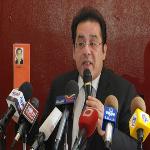21 September 2010

Photo: AFP
Opposition leader Ayman Nour speaks to reporters at a press conference in Cairo, Egypt, 06 Apr 2010
Egypt's al-Ghad or Tomorrow Party has announced a boycott of the upcoming parliamentary election. Al-Ghad's leader, former presidential candidate Ayman Nour, is calling the November elections "rigged," echoing earlier calls for boycott by opposition figure and Nobel Prize winner, Mohamed ElBaradei. This wouldn't be Egypt's first boycott. Two decades ago, opposition parties banded together and refused to participate in the 1990 Parliamentary vote.
But most analysts say that was likely a mistake. Shadi Hamid is Director of Research at the Brookings Institute's Doha Center and a Fellow at the Saban Center for Middle East Policy.
Hilleary: The Egyptian Opposition figure Mohamed ElBaradei has been calling for a boycott of elections similar to that which was undertaken by opposition parties back in 1990. Take us back twenty years-what happened and what was the outcome?

Brookings Institute
Shadi Hamid, Director of Research at the Brookings Institute's Doha Center and Fellow at the Saban Center for Middle East PolicyHamid: The 80s had been a period of greater political openness. There had been some hopes for democratization, so for much of the decade, things were looking up. Then, toward the end of 1988, things started to go downhill.
The regime started to reinforce its grip on power and it instituted a new electoral law that the opposition found to be unfair. They weren't consulted about it and they saw this as a major regression on the part of the regime.
So based on that and also based on a generally more repressive posture from the government at that time, the opposition got together-and this includes primarily the liberal Left party, the leftist Tegemmo Party, as well as the Muslim Brotherhood, and in what was actually a fairly rare instance, they were able to actually agree on a common position. So they boycotted.
Hilleary: But it didn't work out well for them in the end, did it?
Hamid: No, it didn't. The first thing the Left Party definitely didn't consider it to be a success because-and throughout the 80s-they had had a significant representation in Parliament and obviously with a boycott, they were out of the scene for a few years, and when they ran again in 1995, they had become much weaker and weren't able to win many seats.
And that's the problem with boycotts in general. It removes you from the political scene to some extent. You have less of a voice; you have less of a platform. Because in the end, even though the Egyptian Parliament isn't very strong, it still gives opposition groups a venue to articulate their concerns, to get media coverage, and so on.? So that's one of the major costs that opposition groups have to consider when they are making this decision
Hilleary: If there's a boycott of these upcoming elections, what impact will that have on the presidential election next year?
Hamid: Well, first of all, there won't be much of a boycott in the upcoming parliamentary election. Mohamed ElBaradei is obviously making this a key part of his campaign and he's really trying to bring the opposition together around that vision. But so far, he's largely by himself in that even his closest ally in Egypt now -- the Muslim Brotherhood--is leaning towards participation.
So we're starting to see some division in the ranks of the opposition. The Wafd Party has also made clear that they're going to participate. And the Brotherhood and the Wafd are really the two strongest organized political forces in Egypt today. So considering that, any boycott is going to be weak and largely ineffective. Boycotts only work if all the major parties agree and are able to form a unified stand. And that's not the case now.
You know, I don't think the question is whether or not a boycott would be successful. I think the question is why did the opposition fail to unify and fail to have a strong stand in facing the regime.
I think there's a very strong argument that now was the right time for a boycott and to really send a strong statement, not only to the regime but to the international community, that the process is no longer considered legitimate, and a stronger stance has to be taken. And that's what ElBaradei has been trying to promote?
There have been parliamentary elections since 1976, and things have actually gotten considerably worse, more authoritarian than it was in the mid-1980s. So considering that history, you have to start to wonder, is the current strategy working?